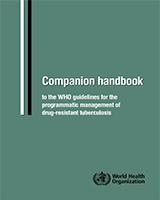To develop this Handbook, a prospective table of contents with the main topical areas being faced by clinicians, health-care workers, and TB programme managers implementing WHO and national policies on drug-resistant TB was developed by the chief editors, with the input of members of the WHO Green Light Committee. This table was based heavily on the areas already covered in the 2008 emergency update of the WHO guidelines for the programmatic management of drug-resistant tuberculosis, and on emerging new policy areas developed by WHO after 2008. Two leading international clinical and public health practitioners were assigned to draft each chapter of the Handbook, drawing on the best practices reported in the literature and based on their professional experience. The corresponding draft chapters were subsequently reviewed by at least two external experts in the respective field. The final draft of the Handbook was reviewed by five external experts bringing together the perspective of patients, clinicians, researchers, TB programme managers and national TB policy-makers, all well experienced in their respective fields. The chief editors of the Handbook were responsible for the technical editing of the document, taking into account the feedback received from the reviewers and existing WHO policies. The most sensible and relevant expert opinions were presented in those instances where there was no approved WHO policy, albeit without recommending any specific course of action.
Declaration of interest forms were obtained from all non-WHO contributors and reviewers of the Handbook. The following potential conflicts of interest were declared:
Charles Daley reported being chair of the data monitoring committee for clinical trials for delamanid (US$30 000 over five years).
Dalene von Delft declared having received funding to cover flight, hotel and per-diem costs to attend meetings from AERAS, CPTR, Janssen Pharmaceuticals, TAG, and USAID.
Maria I. Quelapio declared having worked until 2010 with the Tropical Disease Foundation, which had a contract with Otsuka for a clinical trial on delamanid, a new anti-TB drug.
Salmaan Keshavjee declared that his employer has ongoing research grants from Eli Lilly Foundation (USD$2.5 million) and Janssen Pharmaceuticals (USD$2.5 million); and that he had a consultancy contract (US$3900) with Johnson & Johnson.
The WHO Secretariat assessed the interests declared by each contributor to the Handbook. Potential conflict of interest was not identified to preclude Charles Daley, Dalene von Delft and Maria I Quelapio from contributing to the development of the Handbook, given that this document is not presenting new WHO policies. The role of delamanid in the treatment of MDR-TB is not addressed in this version of the Handbook. Salmaan Keshavjee did not contribute to any chapter of this Handbook related with the use of bedaquiline, a new anti-TB drug developed by Janssen, a subsidiary of Johnson & Johnson. No conflict of interest was considered for the funding reported from the Eli Lilly Foundation by Salmaan Keshavjee, given that Eli Lilly Inc. is currently only producing cycloserine and capreomycin for the United States market (and not for any others).

